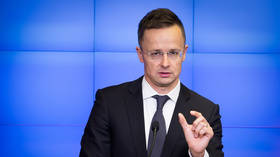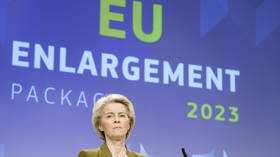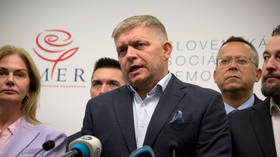EU state explains objection to Ukrainian membership

Conditions are simply not right for the European Union to consider membership for Ukraine, Hungarian Foreign Minister Peter Szijjarto said on Wednesday.
His words came in response to European Commission President Ursula von der Leyen's enlargement proposal earlier that day in Lisbon. She had said that that the EU should commence “accession negotiations” with both Ukraine and Moldova, while upgrading the former Soviet republic of Georgia to official candidate status.
“By admitting Ukraine, the EU would also get war, which obviously no one wants to happen,” Szijjarto said, according to Hungarian media. “Enlargement should serve to spread peace, not to bring war into the EU.”
He said it would be “absurd” for Brussels to assess Ukraine’s progress in implementing reforms or rule of law or any other membership criteria, given the ongoing conflict.
“Right, there is a war in Ukraine, so we can see that neither media freedom nor freedom of speech is enforced, we can see that elections are not held either,” Szijjarto noted.
Budapest’s standing position is that Ukraine needs to restore the rights of the Transcarpathian Hungarian community to the level they had in 2015, before Kiev’s drive to disenfranchise the Russian-speaking population.
“Since, according to the European Commission, Ukraine has not met the conditions set for membership, we do not consider any further steps to be timely with regard to the accession negotiations with Ukraine,” the foreign minister concluded.
According to Szijjarto, the bloc is facing serious security and economic challenges and is getting weaker, so if it’s looking to admit new members as a way of regaining strength, it should look to the Western Balkans, first and foremost Serbia, instead.
According to an EC report, the talks with Ukraine should begin once Kiev satisfies the remaining demands involving the fight against corruption, adopting an EU-compliant law on lobbying and “strengthening safeguards” for ethnic minorities.
The EU has not admitted any new members since Croatia in 2013. Earlier this year, Brussels outlined a vague plan to expand by 2030, eyeing the rest of the former Yugoslavia, Albania, Georgia, Moldova and Ukraine.














